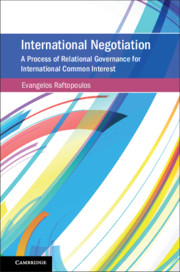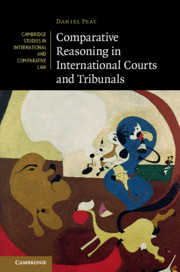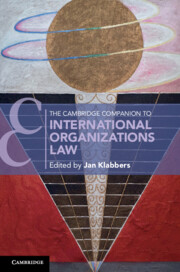International Negotiation
A Process of Relational Governance for International Common Interest
£94.00
Part of Cambridge Studies on Environment, Energy and Natural Resources Governance
- Author: Evangelos Raftopoulos, Panteion University of Athens
- Date Published: January 2019
- availability: In stock
- format: Hardback
- isbn: 9781107196643
£
94.00
Hardback
Other available formats:
Paperback, eBook
Looking for an inspection copy?
This title is not currently available on inspection
-
Evangelos Raftopoulos explores international negotiation as a structured process of relational governance that generates international common interest between and among international participants and in relation to the international public order. He challenges prescriptive models of negotiation - developed in international relations and positivistic approaches to international law, which artificially separate treaties from negotiation in the name of 'objectivity' - and opens a window for looking at international negotiations from a novel, international law perspective. Using an interdisciplinary approach that incorporates law, philosophy, politics, and linguistics, he proposes a holistic, theoretical model of multilateral international negotiation that not only offers a 'subjective' view of international law in practice but also demonstrates the importance of understanding the horizontal normativity of international ordering. This work should be read by academics and practitioners of international law and negotiations, officials of international organizations, and anyone else interested in international law and international relations.
Read more- Proposes a relational theory of international creative negotiation
- Adopts a novel view of international negotiation as a relational, contextual, textual, three-phased and inter-subjective process of multilateral governance
- Equips readers with the fundamental conceptual elements needed to understand international negotiation as a structured, multilateral process generating and constructing international common interest
Reviews & endorsements
'Raftopoulos challenges scholars of international relations and international law to think of the treaty process as an integrated set of interim, subjective practices. He promotes a relational theory that treats the links between negotiations and treaties as an ongoing process of promoting global welfare. His approach goes well beyond conventional strategic power based theories of international relations and static positive theories by international lawyers about the nature of multilateralism itself.' Peter M. Haas, University of Massachusetts, Amherst
See more reviews'When I was involved in negotiations for drafting treaties, I often had the feeling that the negotiators, rather than putting forward particular positions, were called to define an international common interest and to envisage a regime subject to future governance and re-negotiation. This book goes beyond feelings and subjects the process of building international common interests to a rigorous analysis within a solid theoretical approach.' Tullio Scovazzi, University of Milano-Bicocca, Milan
Professor Evangelos Raftopoulos presents a new and welcome perspective on the international negotiation process. Without doubt this in-depth and thought-provoking study of international negotiations of legal instruments will generate much discussion as he takes the reader through the matrix of the international negotiation process through both an intellectual and pragmatic lens. Professor Raftopoulos demonstrates his extensive knowledge of the complexities and intricacies of international negotiations in this masterfully written book.' Nilufer Oral, Istanbul Bilgi University and Member of the UN International Law Commission
'Negotiations are traditionally perceived as belonging to the realm policy; the frequent end result of it, treaties, as belonging to the realm of law. This interesting and innovative study by a leading Greek international law scholar brings both strands together in the analysis as to how they contribute to the crystallization of international common interest.' Robert Kolb, University of Geneva
'As a colleague of Professor Evangelos Raftopoulos, I would like to express my satisfaction that Cambridge University Press is publishing his book entitled International Negotiation: A Process of Relational Governance to International Common Interest. Although it is not evident from the title of this forthcoming book and the one that I received from Professor Raftopoulos many years ago, there are many problems and principles of public international law that form the basis of the content of both books. The title of the former book of Professor Raftopoulos that I mentioned is The Inadequacy of the Contractual Analogy in the Law of Treaties published in 1990. I congratulate Professor Raftopoulos for adding the interesting new book of the Greek Professor to the fundamental literature of international law.' Budislav Vukas, University of Zagreb
'The South China Sea arbitration … is so far the first attempt by a claimant State in the South China Sea to resort the dispute to a third party forum … (and) it does not make a desired contribution to resolving the real dispute … Nevertheless, it does motivate China and ASEAN to speed up the negotiation on the consultation of the Code of Conduct. Raftopoulos' book, viewing international negotiation as a process of relational governance based on the analytical framework of international common interest, will shed light on countries who are in favor of preference for negotiation in managing international disputes. The book generates much discussion on the matrix of the international negotiation process through both an intellectual and pragmatic lens, and should be read by academics and practitioners of international law and negotiations, officials of international organizations, and anyone interested in the interdisciplinary study of international law and international relations.' Dr Nong Hong, Ocean Yearbook
Customer reviews
Not yet reviewed
Be the first to review
Review was not posted due to profanity
×Product details
- Date Published: January 2019
- format: Hardback
- isbn: 9781107196643
- length: 284 pages
- dimensions: 235 x 157 x 19 mm
- weight: 0.53kg
- availability: In stock
Table of Contents
Part I. Theoretical Approaches to International Negotiations and International Common Interest
Section 1. The 'Theorization' of International Negotiation
Part II. The Negotiation Phases in the Conventional Construction of International Common Interest
Section 3. The Pre-Negotiation Phase as a Process of Transformative Governance.
Sorry, this resource is locked
Please register or sign in to request access. If you are having problems accessing these resources please email lecturers@cambridge.org
Register Sign in» Proceed
You are now leaving the Cambridge University Press website. Your eBook purchase and download will be completed by our partner www.ebooks.com. Please see the permission section of the www.ebooks.com catalogue page for details of the print & copy limits on our eBooks.
Continue ×Are you sure you want to delete your account?
This cannot be undone.
Thank you for your feedback which will help us improve our service.
If you requested a response, we will make sure to get back to you shortly.
×














